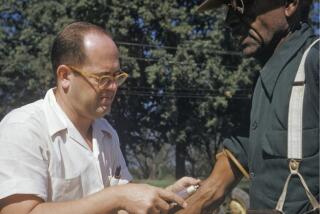New Campaign Keyed to Black Smokers : Health: Federal officials cite evidence that African-Americans have a harder time quitting than do whites and Latinos.
- Share via
WASHINGTON — Saying that evidence shows black Americans have a much tougher time giving up cigarettes permanently than whites and Latinos, federal health officials announced a new anti-smoking campaign Thursday designed to help them kick the habit for good.
“We have made significant progress against smoking among African-Americans, but blacks still smoke at a higher rate than other U.S. populations,” said Robert Robinson of the Office on Smoking of the federal Centers for Disease Control and Prevention.
“Smoking represents a serious health risk for all smokers, but the 6 million African-Americans who currently smoke face higher rates of lung cancer, other cancers, heart disease and stroke when compared to whites,” he added.
An estimated 46 million Americans smoke and 400,000 die every year from cigarette-related diseases. The CDC has estimated that more than 45,000 blacks died last year from conditions associated with smoking.
Releasing the results of a new study, the CDC said that, while 42% of the smokers it surveyed were able to stay off cigarettes for at least one day, 86% of them relapsed and started smoking again. Of black smokers, 49% could stop for a day, compared to 40% of whites, CDC said.
But blacks were the least likely to remain off cigarettes, with fewer than 8% abstaining for at least one month, compared with 14% of the whites who smoke and 16% of Latinos, CDC said.
The higher level of smoking among blacks dates back at least to 1965, the year after the first landmark surgeon general’s report on smoking, and the year the federal government began tracking smoking by race. In that year, nearly 46% of blacks smoked, compared to 42% of whites, CDC said.
The gap between the two groups had all but disappeared by 1990, when about 26% of blacks and whites reported smoking. But between 1990 and 1991--the period of CDC’s most recent data--smoking among blacks increased by 3 percentage points, “a serious setback,” Robinson said.
“We now estimate that about 29% of blacks smoke compared to 25.5% of whites,” he said.
Robinson said that experts do not know why blacks are less likely to remain off cigarettes than other groups but “black smokers appear to be more dependent on nicotine than whites,” possibly because they smoke cigarettes with a higher tar and nicotine content, including menthol brands, he said.
“Another reason may be that blacks do not have access to adequate culturally sensitive materials about smoking cessation,” he said.
Also, the tobacco industry specifically gears advertising to blacks through promotions on billboards in black neighborhoods and in African-American publications, he said. “Wherever they (industry advertisers) find the opportunity to target blacks, they will,” he said.
One final reason might be that in recent years tobacco manufacturers “have penetrated the market with discount cigarettes--brands priced low enough to persuade many smokers to keep smoking, individuals who otherwise may have quit for economic reasons,” he said. “Worst of all, the wide availability of lower-priced cigarettes may also lure new smokers of all races and ages to begin to smoke.”
The tobacco industry reacted angrily to Thursday’s announcement.
“There is no reason to think that black people are any less aware of the risks linked to smoking than anyone else,” said Thomas Lauria, a spokesman for the Tobacco Institute. He condemned the specialized campaign, saying that it employed a “paternalistic approach” that “implies (blacks) need special health information that others don’t.”
CDC and the National Medical Assn.--the national organization of black physicians--said they will spend $200,000 for advertising aimed at blacks, using TV, radio, billboards and public transportation to send anti-smoking messages.
Called “Legends,” the campaign “features some of our great civil rights leaders and contrasts their heroic lives with the needless deaths caused by cigarette smoking,” said Dr. Richard O. Butcher, of the National Medical Assn. The campaign will also offer tips specifically geared to blacks on how to quit, he said.
But the CDC and the medical group acknowledged that the investment is small compared to the $4 billion spent by the tobacco industry in annual advertising.
More to Read
Sign up for Essential California
The most important California stories and recommendations in your inbox every morning.
You may occasionally receive promotional content from the Los Angeles Times.










